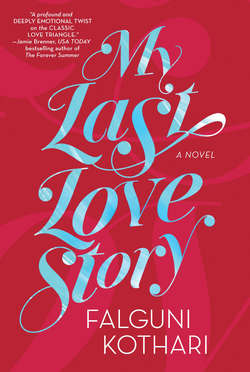Читать книгу My Last Love Story - Falguni Kothari - Страница 13
Оглавление6
Kamlesh Desai was a one-man riot with a deep-chested guffaw he was unafraid to overuse.
It was easy to see where Nirvaan had gotten his energy and charm even though the father-son duo looked nothing alike. My father-in-law was a small, spare man with a big mustache and a full head of hair. Even as he pushed toward sixty, it was a natural jet-black. He swore that the daily application of a hibiscus-infused coconut oil was the secret to his hair’s health. He kept it parted to the left and combed it several times a day in an offhand unconscious manner with a small maroon comb he carried in his wallet at all times.
I loved my father-in-law’s little quirks. I could watch him for hours and never get bored. For such a petite man, he had a king-size personality and an even bigger heart.
Compared to her husband, my mother-in-law was a mouse. She was quiet and serious but in no way timid. My in-laws were equal partners in life and in business. You picked up on it immediately from the moment you met them. They reminded me so much of my own parents that I sometimes found it impossible to be around them without getting emotional. But the same also made it easy for me to love them.
I used to tease Nirvaan that the only reason I’d married him was because I was madly in love with his father. And since I couldn’t have my main man, I’d settled for his gene pool.
“Your uncle just can’t sit still,” my mother-in-law muttered, shaking her head at her husband who was expelling his inexhaustible energy rather loudly into a karaoke mic.
Smiling at my gyrating father-in-law, I winced when the surround sound suddenly blared off-key and filled the house with shrill maniacal bleats. Besides enthusiasm, he had zero aptitude for singing.
It also amused me that my mother-in-law never addressed her husband by name, not directly, not even when she spoke of him in context. It was always “your uncle” or “your daddy” or “Mr. Desai” or “my husband” or “that man,” if she was angry with him, but never simply “Kamlesh.” It was an old Indian custom—I supposed, a sexist one in the guise of respect—which forbade a wife to call her husband by his given name. I had no idea why my mother-in-law still practiced it.
She was a modern woman. She wore Western clothes, even shorts on occasion, though never for community or religious functions or in India. She was a workingwoman, had been for most of her life. My in-laws had come to America, leaving their six-year-old daughter and two-year-old son with their parents, to build a better life for their family than the one they’d had in India. They’d come in search of the American Dream and found it.
Kamlesh Desai had worked at gas stations and grocery stores while Kiran Desai had cleaned houses and cooked for people until, between them, they’d saved enough money to invest in a California highway motel. Still, they’d worked three jobs each, pouring their savings into their first motel and then another and another. Eventually, they’d quit the other jobs and focused their energies on expanding their motel business. Once their green cards had come through, they’d brought their teenage children to LA and settled down there.
My in-laws were self-made, hardworking people, even now.
So it baffled me that my mother-in-law still held on to an antiquated custom in a country she, too, refused to call home. My own parents had addressed each other by name and a whole slew of endearments, including bawaji and bawiji, which most simplistically translated to “Parsi man” and “Parsi woman.”
